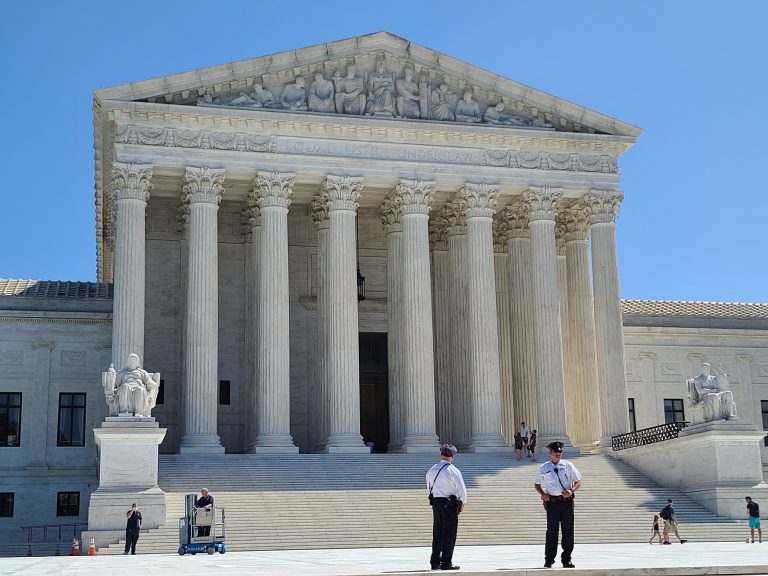It’s becoming impossible for the Supreme Court not to weigh in on whether felons, or at least the non-violent ones, can own guns.
Since the Court handed down its landmark ruling in New York State Rifle and Pistol Association v. Bruen last June, lower courts across the country have been grappling with how to apply the case’s text, history, and tradition-based approach to deciding Second Amendment challenges—often arriving at competing conclusions. The constitutionality of banning felons from gun ownership for life has been among the most prominent questions they’ve addressed.
The federal felon-in-possession prohibition, or 18 U.S.C. § 922(g)(1) as it is formally known, permanently strips the Second Amendment right to keep and bear firearms from anyone who has been convicted in any court of a crime punishable by more than a year in prison. It’s a prohibition that has been relatively uncontroversial for most of its history, at least as far as American gun control laws go. It’s also been used prolifically by law enforcement. According to federal data from the U.S. Sentencing Commission, the vast majority of federal firearms law offenders (79 percent) are convicted under 922(g)(1).
However, in recent years, a growing body of gun-rights advocates, civil libertarians, and criminal justice reformers have taken an increasingly skeptical eye toward the prohibition, particularly regarding non-violent felons. That movement, combined with the Bruen decision’s burden-shifting test requiring the Government to demonstrate that its gun laws are constitutional, have placed the prohibition on a crash course toward imminent Supreme Court review.
This could happen in one of two ways. The more straightforward one is the Court agreeing to take a case on the felon-in-possession ban.
Competing rulings out of the federal circuit courts provide the likely vehicle for this. To date, three federal appellate courts have handed down decisions concerning the validity of the federal ban in light of Bruen, and they are currently split 2-1 on upholding it under the Second Amendment.
The most recent contribution came from the Tenth Circuit Court of Appeals, where a three-judge panel last week declined to determine whether the ban implicated the text of the Second Amendment or comported with the nation’s historical tradition of gun regulation, as the Bruen test requires. Instead, the panel found that the Supreme Court’s assurances in Heller and Bruen that those cases did not immediately call the ban into question were sufficient for determining that a Utah woman convicted of felony bank fraud for writing a fraudulent $498 check at a grocery store when she was homeless could be disarmed for life.
“Though Bruen created a new test for determining the scope of the Second Amendment, the Court didn’t appear to question the constitutionality of longstanding prohibitions on possession of firearms by convicted felons,” Judge Robert E. Bacharach, a Barack Obama appointee, wrote on behalf of the panel in Vincent v. Garland.
That analysis was nearly identical to the one done by an Eighth Circuit panel in June when it arrived at the same conclusion concerning a Minnesota man with prior drug convictions. It, too, relied heavily on Justice Antonin Scalia’s remarks in Heller that the Court was not casting doubt on the constitutionality of “longstanding” firearms prohibitions, including the one for convicted felons.
“Given these assurances by the Supreme Court, and the history that supports them, we conclude that there is no need for felony-by-felony litigation regarding the constitutionality of § 922(g)(1),” Judge Steven Colloton, a George W. Bush appointee, wrote in U.S. v. Jackson.
However, between those two decisions, an en banc panel of the Third Circuit ruled that the federal prohibition on felons owning firearms was unconstitutional as applied to a Pennsylvania man with a nearly 30-year-old conviction for lying on a food stamp application.
“We agree with Range that, despite his false statement conviction, he remains among ‘the people’ protected by the Second Amendment,” Judge Thomas Hardiman wrote for an 11-4 majority in Range v. Garland. “And because the Government did not carry its burden of showing that our Nation’s history and tradition of firearm regulation support disarming Range, we will reverse and remand.”
Given that the Range decision called into question the validity of a relatively longstanding federal criminal statute, there’s a high probability that the Department of Justice (DOJ) will appeal. That makes it the most likely vehicle for the Supreme Court to hear a case specifically focused on 922(g)(1). The DOJ has not yet filed a cert petition in the case, but the Supreme Court extended its deadline to do so until October 5th.
But even if the DOJ decides not to risk an appeal to a court potentially skeptical of federal criminal statutes, a Second Amendment case the High Court has already agreed to take provides an opportunity for it to opine on 922(g)(1) ‘s legality.
The Court agreed to hear U.S. v. Rahimi this Fall, and though that case concerns an entirely separate prohibiting offense—922(g)(8) or the federal gun ban for those under domestic violence restraining orders—anything but the narrowest of rulings would impact how courts understand 922(g)(1) moving forward.
That’s because either way the Court rules on the constitutionality of the restraining order gun ban, it’s likely to articulate a framework for deciding who may or may not be disarmed under the Second Amendment. That will necessarily impact how future courts look at felon-in-possession laws, whether or not the Court addresses 922(g)(1) by name. Ultimately, the Court could write its decision broadly and impact the rest of the federal prohibiting offenses to avoid having to take future challenges on a case-by-case basis.
Felon-in-possession prohibitions are one of the bedrock gun-control laws on the books today. That federal appeals courts are coming to opposite conclusions on the ongoing viability of the ban necessitates the Supreme Court weighing in. Whether it does so just by reiterating its Heller dicta in Rahimi or by formally articulating how to perform the Bruen test for prohibited person cases, it’s almost a certainty that the High Court will address the future of felon gun rights in the near future.






